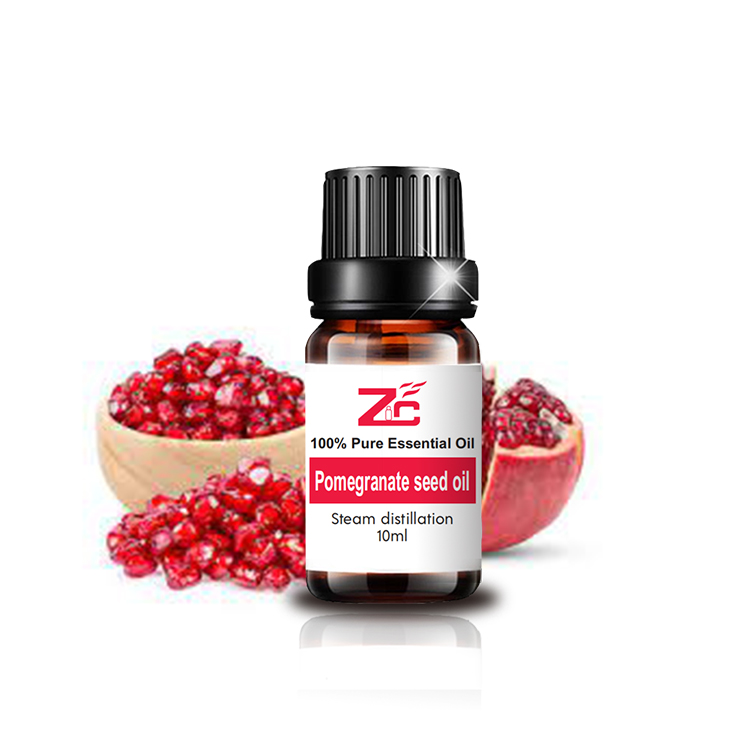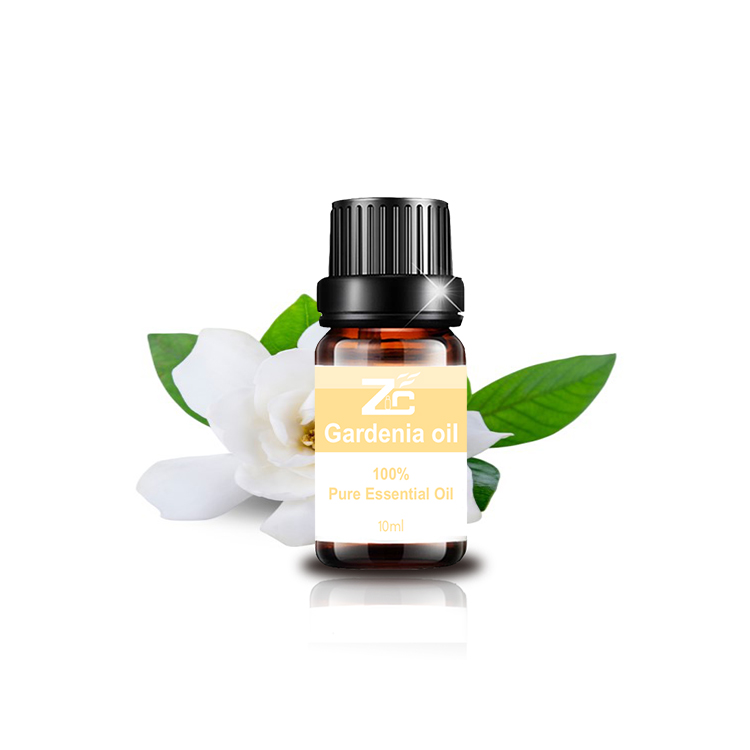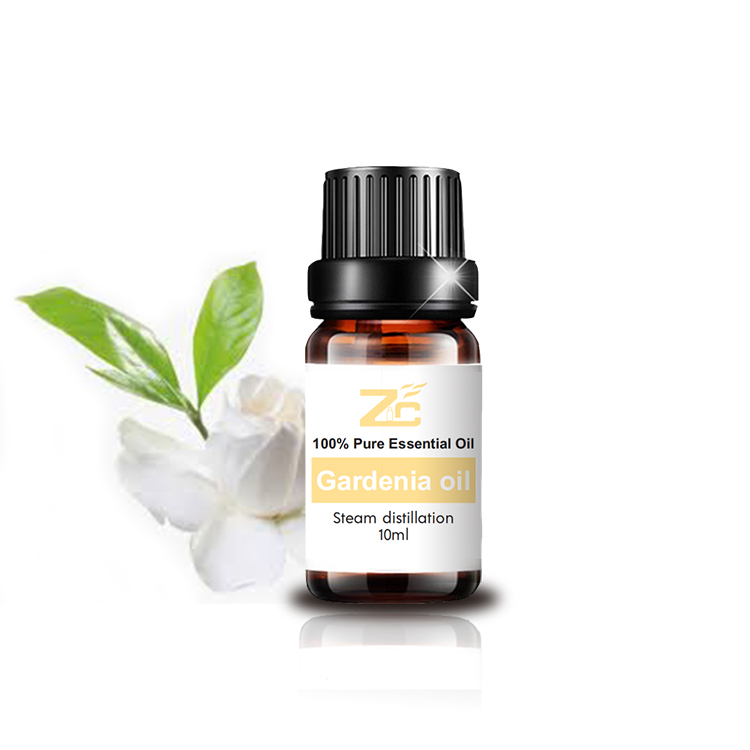-

Pure Aromatherapy Pomegranate Seed Essential Oil Punicic Acid
Benefits
- It can support healthy aging.
- It can support skin hydration.
- It can help manage inflammation.
- Antioxidants can provide sun and pollution protection.
- Has scalp and hair benefits.
Uses
Create A Hair Rejuvenation Mixture
To reap the hair-nourishing benefits of pomegranate seed oil, try combining it with coconut or jojoba oil, and then leave it in for an hour or overnight for the best results. (Be sure to rinse thoroughly.) Alternatively, you can also mix it with your shampoo or use it as a hot oil treatment.
Cook With The Oil
Edible pomegranate seed oil is a quick and easy way to add its benefits directly into your diet. Pomegranate seed oil can help fight diabetes and even promote weight loss. If using it as a frying oil, make sure to add a slightly smaller ratio than you would of olive or sesame oil.
Use It As Facial Or Body Oil
Since punicic acid in pomegranate seed oil slows the aging of skin cells, using it as a face cleanser can visibly reduce signs of aging. Simply put a few drops on your palm before bed, massage onto your face, and wash it off in the morning. To use it as a body oil, rub a few drops on scars, blemishes, or other target areas, and let your skin absorb the vitamins to lead you toward smoother, softer skin.
-

Factory Supply Pomegranate Seed Oil For Face Skin And Hair Moisturize
Benefits
Makes Skin Youthful
Natural Pomegranate Seed Oil can make your face look more youthful as it boosts collagen production that improves skin regenerative properties of your skin cells. It makes your skin tighter and gives a glowing complexion that will make you feel younger.
Cleanses Scalp
Antipruritic effect of our natural Pomegranate Seed Oil can prove to be useful for removing dirt, bacteria, and other impurities from your scalp. Pomegranate oil proves to be an excellent addition to hair oils, shampoos, and other hair care products.
Reduces Wrinkles
Powerful antioxidants present in pomegranate seed oil will prove to be effective in reducing fine lines and wrinkles. It protects the skin from free radicals and oxidative stress that are the main reasons behind the aging of the skin. It can be used for making anti-aging creams and lotions.
Uses
Massage Oil
Massage our pure Pomegranate Seed Oil on your body, it helps your skin to become soft, plump, and smooth. If you have blackheads or dark spots on your face, you can massage Pomegranate Seed Oil on your face daily.
Soap Making
Organic Pomegranate Seed Oil is an ideal ingredient when it comes to making soaps. This is because of its ability to cleanse the skin and it also restores the moisture level of your skin. Pomegranate oil may also impart a blissful mild aroma to your soaps.
Scented Candles
Blend of mild herbal and slightly fruity odor makes pomegranate seed oil ideal for making scented candles that have a subtle aroma. You may also use it as a base note in perfumes, colognes, deodorants, and other personal care products.
-

Wholesale Pure and Natural wild chrysanthemum flower oil essential oil
Benefits
Firstly, Wild Chrysanthemum Flower can relieve both Exterior syndromes caused by Wind-Heat and Warm diseases that are manifesting in our defense system. By dispelling Wind pathogens and removing Heat from our lungs, it can help to treat fever, headache and cough caused by Warm Heat invading our lungs.
Secondly, Wild Chrysanthemum Flower can remove Liver Heat and dispel Wind-Heat caused by Liver Deficiency. It is indicated for the flaming up of Fire in our Liver, which is often followed by symptoms such as conjunctival congestion with pain and swelling, painful sensation in the eyes, tears, or blindness due to the Deficiency of blood in our Liver and Kidneys.
Thirdly, Wild Chrysanthemum Flower can reduce vertigo and headache caused by the flaming up of Liver yang or Liver Heat. Its effect is further enhanced when used with herbs that can tonify yin and subdue Liver yang to treat the hyperactivity of our Liver. Besides this, it is indicated for carbuncle and furunculosis by clearing Heat-toxin.
Blends Well With:
Amyris, Bergamot, Black Pepper, Cedarwood, Frankincense, Jasmine, Pink Grapefruit, Orange, Sandalwood
-

High Quality Pure Carrot Seed Essential Oil for Massage Skin Body Care
Benefits
- Aromatic - It’s warm and earthy fragrance soothes your mind and provides relief from fatigue and stress. The refreshing scent of this oil can also be used to deodorize your rooms.
- Tightens Skin - When used as a cosmetic ingredient, it tightens your skin and tones your body. Thus, it prevents your skin from getting saggy and improves its texture as well.
- Massage Oil - Organic Carrot Seed Oil is one of the best massage oils as it reduces joint, stretch marks and muscle strain owing to its anti-inflammatory properties. The benefits of aromatherapy can also be retrieved via massage to some extent.
- Detoxifying Agent - It also detoxifies your skin by removing dead skin cells, dust, oil, and other impurities. As a result, your skin feels light and fresh after its use.
- Antibacterial -Antibacterial and antifungal properties of wild carrot seed essential oil make it useful for treating skin infections. By killing the harmful bacteria it protects your skin from issues like acne and pimples.
- Moisturizing - Pure Carrot Seed Oil acts as a natural moisturizer and keeps your skin supple and soft throughout the day. For that, you need to add it to your moisturizers and body lotions.
Uses
- Energizing, Mind & Body - The stimulant properties of Natural Carrot Seed Oil proves to be effective for energizing your mind and body. For that, you need to diffuse this oil in a diffuser.
- Strengthening Mucous Membranes - When you use this oil via aromatherapy, it strengthens your mucous membranes and blocks unwanted viruses and parasites from entering your body. As a result, it is healthy for your respiratory system.
- Repairing Damaged Skin - Damaged skin can be cured by incorporating Carrot Seed Oil in your daily skincare regime. It also protects your skin from external factors like pollution and sunlight.
- Rejuvenating Effects - The rejuvenating effects of this oil make your skin smoother, firm, and revitalized. Softening your skin also heals scars and reduces irritation.
- Repairing Hair Issues - Hair issues like split ends can be repaired by massaging your scalp and hair strands with a diluted form of this oil. It also enhances your scalp’s health naturally.
- Treating Dandruff - By improving blood circulation in the scalp area, it reduces issues like irritation and dandruff. It also kills harmful fungus and bacteria that may cause scalp itchiness.
-

OEM / ODM Supply Available For Finest Quality Wholesale Cumin Oil
Benefits
Male Infertility
Studies with both infertile men and rats have found that cumin oil can boost sperm count and help sperm swim faster. Antioxidants in the oil likely help protect sperm from damage.
Reduce anxiety
Thanks to its active ingredient, thymoquinone, which increased serotonin and GABA, cumin oil decreased anxiety and depression and improved mood and cognition.
Regulate digestive health
Taking cumin oil is associated with relieving stomach pain and cramps. The oil can help to reduce gas, stomach bloating, and the incidence of ulcers as well.
Uses
For foods and drink
Add to recipes from met main courses to soups, stews teas and smoothies
For diabetes
1 gram of black seed powder taken twice a day for up to 12 months.
For high blood pressure
0.5–2 grams of cumin powder daily for up to 12 weeks or 100–200 milligrams cumin oil twice daily for eight weeks.
To improve sperm function
2.5 mL cumin oil twice daily for two months.
-

Top Grade 100% Pure Essential Organic Black Cumin Essential Oil
Cumin Oil Uses and Benefits
- Cumin essential oil is a popular spice that can be used to enhance culinary dishes from around the world. For a spicy cumin flavoring, add one to three drops of Cumin essential oil to stews, soups, and curries. Cumin oil also provides an easy and convenient replacement for ground cumin. Next time you have a recipe that requires ground cumin, substitute it with Cumin essential oil
- If you are in need of quick digestive relief, take Cumin oil internally to assist with digestive health. Cumin oil is a great essential oil for supporting digestive health, and it can help relieve occasional digestive discomfort. When stomach troubles arise, add one drop of Cumin oil to four ounces of water and drink, or add a drop of Cumin oil to a veggie capsule and ingest with liquid.
- Cumin oil has the ability to purify the body’s systems, and it is ideal for internal cleansing.
- Before you leave your house for a night out, quickly freshen up with a Cumin essential oil mouth rinse. Simply add one to two drops of Cumin oil to four ounces of water and gargle. This effective mouth rinse will leave your breath feeling and smelling fresh and clean.
Oils that Blend Well with Cumin oil
Cumin essential oil blends well with Cilantro and Coriander essential oils for diffusion.
Cautions
Possible skin sensitivity. Keep out of reach of children. If you are pregnant, nursing, or under a doctor’s care, consult your physician. Avoid contact with eyes, inner ears, and sensitive areas.
-

Factory Supply Pure Natural Plant Black Pepper Essential Oil For Spice
Benefits
Skincare Products
Our Pure Black Pepper Essential Oil fights against sagginess of skin and muscles and proves to be an excellent ingredient in muscle and skin toners. Therefore, you can use it as a face toner after diluting it with a suitable carrier oil.
Cleanses Skin
Exfoliating properties of Black Pepper Oil can be used to get rid of dead skin cells, excess oils, and other toxins from your skin. It also contains antioxidants that fight against free radicals and keep your skin soft and youthful.
Eliminates Toxins
Diuretic properties of our Natural Black Pepper Essential Oil help to eliminate the toxins from your body via urine and sweat. It also reduces your weight as the excess water and fat get eliminated from your body during this process.
Uses
Aroma Diffuser Oil
Powerful antibacterial properties of Organic Black Pepper Essential Oil can be used to sanitize your surroundings. It kills the parasites, germs, and viruses that are present in the air and keeps the environment clean and healthy for your family.
Scented Candles & Soap Bars
Fresh sharp scent with a spicy touch gives it an alluring fragrance, pour a few drops of Black Pepper Oil in your DIY Perfumes, Soap Bars, Scented Candles, Colognes, and Body sprays for enhancing the fragrance
Relieves Cramps & Spasms
Antispasmodic effects of our Pure Black Pepper Essential Oil allow you to use it against muscle cramps, convulsions, spasms, etc. Therefore, athletes and children can use essential oil to remain fit and healthy during their sporting events.
-

Garlic Hair Growth Essential Oil Repair Damaged Beauty Hair Care
ABOUT
One of the most popular herbal preparations and seasonings of all times, garlic with its intense odor, has a strong reputation that precedes it. Garlic has been used all over the world to flavor foods, ward off evil spirits, as an offering to ancient deities, as well as for its healthful properties.
Benefits
- Tick bites.
- Ringworm.
- Jock itch.
- athlete’s foot.
- Boosts immunity
- Works as an anti-inflammatory
- Clears up skin
- Protects your food
Precautions
Garlic may cause gastrointestinal disturbance in sensitive individuals or in persons with acute or chronic stomach inflammation. We recommend that you consult with a qualified healthcare practitioner before using herbal products, particularly if you are pregnant, nursing, or on any medications.
-

Top Grade Wholesale bulk Price High Quality Gardenia Essential Oil
Benefits
Room Odor
If you use an essential oil diffsuer, gardenia essential oil is a very common choice, due to its unique sweet scent. The antibacterial qualities can cleanse your room or house of airborne pathogens, and also eliminate any odors from animals, smoke or food.
Baths
Putting a few drops of gardenia essential oil into your bath will fill your bathroom with a wonderful aroma and provide a muscle-relaxing, stress-relieving atmosphere for your quiet time.
Facial Steam
You can add a few drops of this oil to a bowl of boiled water and then inhale the steam for a quickly and directly addressing respiratory infections, congestion, low energy, and fatigue.
Uses
Massage
When added to a carrier oil, gardenia essential oil makes a great massage oil. The soothing scent is sure to put anyone in a pleasant mood, and the natural stress-relieving properties are sure to help any tense muscles relax.
As a Bath Additive
Adding a few drops of gardenia essential oil to your bathwater is a great way to enjoy the scent of gardenia but also reap its many benefits. Gardenia essential oil helps promote healthy skin, helpful in treating acne, eczema, and other skin conditions.
Inhaled Directly From Your Palm
Simply rub 2-3 drops of gardenia essential oil in between your palms, cup them around your nose and mouth, close your eyes, and slowly breathe in deeply through your nose. The fragrance will help soothe you instantly!
-

Pure Natural Plant Steam Distilled Marjoram Essential Oil For Skincare
Benefits
Excellent for Inhalers
Our pure Marjoram Essential Oil is widely used in the manufacturing of inhalers due to its ability to clear sinuses and cold. It can also provide relief from headaches, coughs, and congestion due to its spasmodic properties.
Relaxing Bath
Our natural Marjoram Essential Oil can be used to enjoy a relaxing bath that will soothe your senses and reduce body ache. You can add it to your shampoos or lotions, or you can make handmade soaps.
Makes Skin Smooth
Incorporating our natural Marjoram Essential Oil in your skincare routine can be a good idea as it nourishes your skin deeply and keeps skin issues at bay. It is helpful in treating rough and patchy skin as it makes your skin soft and smooth.
Uses
Peaceful Sleep
People who are dealing with restlessness or insomnia can diffuse this oil alone or after blending it with Clary Sage Essential Oil. The soothing fragrance and sedative properties of Marjoram Essential Oil will help you to sleep peacefully at night.
Joint Pain Reliver
Anti-inflammatory properties of our fresh Marjoram Essential Oil can be used to treat all types of joint pain like knee pain, elbow pain, etc. It can also be used for treating muscle spasms, body aches, arthritis, and other issues.
Insect Repellent
Mix a few drops of pure Marjoram Essential Oil in water and spray it in your rooms to keep pests and insects away. This essential oil is being widely used in manufacturing room sprays and insect sprays due to its ability to repel insects and viruses.
-

Wholesale 10ml Ginger Oil Hair Growth Oil For Hair Loss Treatment
Benefits
Rejuvenating Bath Oil
Add a few drops of our natural Ginger essential oil in your bathtub filled with water. This will relax your senses and you can also blend it with ginger oil before adding it to the bathtub.
Treats Cold Feet
Blend our natural Ginger essential oil with coconut or jojoba carrier oil and massage it nicely on your feet to get relief from cold feet. Do not forget to rub it on the pulse points for faster relief.
Anti Dandruff Products
Ginger Essential Oil not only prevents dandruff but also thickens your hair on regular usage. It is healthy and ideal for the overall maintenance of your hair and therefore, it is widely used for manufacturing hair conditioners and shampoos.
Uses
Relaxes Muscles
Blend Ginger Essential Oil in a base oil and massage it on the parts that are paining. It will provide instant relief from joint pain and muscle stiffness due to its anti-inflammatory properties.
Relief from Cold
Adding this pure Ginger Essential Oil in rubs and ointments will reduce the mucus that settles in your throat and lungs. It proves to be an excellent remedy to fight against cough and cold symptoms.
Induces Sound Sleep
For enjoying a sound sleep at night, you can apply this best Ginger Essential oil on the back of your pillow. You can also inhale it after adding a few drops on a cloth for similar results.
-

Wholesale Pure Natural Gardenia Essential Oil Good Quality
Gardenia oil has a light floral scent that’s sweet and seductive. It pairs well with other floral scents such as jasmine or lavender. Gardenia oil comes from the gardenia bush and is used for medicinal and cosmetic purposes.
Benefits and Uses of Gardenia Essential Oil
Gardenia oil comes from the gardenia bush and is used for medicinal and cosmetic purposes. It may also reduce muscle aches and pains, including headaches. Gardenia oil is anti-inflammatory and is said to provide relief to people with arthritis, poor circulation, and digestive problems. To take advantage of these properties, gardenia oil can be:
Added to your diffuser to cleanse a room
Mixed with a carrier oil and applied to the skin to speed up wound healing
Dropped into a bath to ease stress and muscle tensionEnjoy the intoxicating aroma of gardenia fragrance oil in candle making, incense, potpourri, soaps, deodorants and other bath and body products!
Precautions:
If pregnant or suffering from illness, consult a doctor before use. KEEP OUT OF REACH OF CHILDREN. As with all products, users should test a small amount prior to normal extended use.

